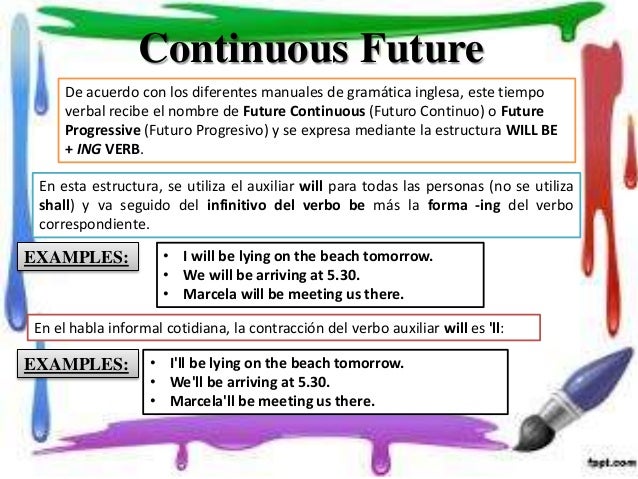FUTURE PROGRESSIVE
Para formar el futuro continuo se utilizan “will be” o “be going to” y el gerundio (infinitivo + “-ing”) del verbo principal.
| Sujeto | Auxiliares | Gerundio |
|---|---|---|
| I | will be am going to be | talking, eating, learning, doing, going… |
| he, she, it | will be is going to be | talking, eating, learning, doing, going… |
| you, we, they | will be are going to be | talking, eating, learning, doing, going… |
1. Affirmative Sentences (Frases afirmativas)
Sujeto + “will be” + gerundio…
Sujeto + verbo auxiliar (to be) + “going to be” + gerundio…
Ejemplos:
| I will be talking. / I’m going to be talking. (Estaré hablando.) |
| He will be eating. / He’s going to be eating. (Estará comiendo.) |
| They will be learning. / They’re going to be learning. (Estarán aprendiendo.) |
2. Negative Sentences (Frases negativas)
Sujeto + “will be” + “not” + gerundio…
Sujeto + verbo auxiliar (“to be”) + “not” + “going to be” + gerundio…
Ejemplos:
| I will not [won’t] be talking. / I’m not going to be talking. (No estaré hablando.) |
| He will not [won’t] be eating. / He’s not going to be eating. (No estará comiendo.) |
| They will not [won’t] be learning. / They’re not going to be learning. (No estarán aprendiendo.) |
Nota: En las frases negativas el auxiliar negativo “not” va entre los verbos auxiliares “will” y “be” o entre “to be” y “going to be”.
3. Interrogative Sentences (Frases interrogativas)
Verbo auxiliar “will” + sujeto + "be"+ gerundio…?
Verbo auxiliar (“to be”) + sujeto + “going to be” + gerundio…?
Ejemplos:
| Will you be talking? / Are you going to be talking? (¿Estarás hablando?) |
| Will he be eating? / Is he going to be eating? (¿Estará comiendo?) |
| Will they be learning? / Are they going to be learning? (¿Estarán aprendiendo?) |
Nota: En las frases interrogativas el sujeto va entre los verbos auxiliares “will” y “be” o entre “to be” y “going to be”.
A diferencia del futuro simple, las dos formas del futuro continuo significan casi lo mismo y son intercambiables. También, los usos del futuro continuo son los mismos del pasado continuo, pero en el futuro.
1. El futuro continuo lo utilizamos para una acción larga que pasará en el futuro y será interrumpida. La acción que se interrumpe está en el futuro continuo y la acción que provoca la interrupción está en el presente simple.
Ejemplos:
| Jose will be [Jose’s going to be] watching the news when you call. (Jose estará mirando las noticias cuando le llames.) |
| Will it be [Is it going to be] raining when l leave? (¿Estará lloviendo cuando salga?) |
2. Se usa el futuro continuo para hablar sobre acciones en un tiempo específicoen el futuro.
Ejemplos:
| Paula will be [Paula’s going to be] living in Spain next April. (Paula estará viviendo en España el próximo abril.) |
| We’ ll still be working [ We’re still going to be working] at 10 o’clock tomorrownight. (Todavía estaremos trabajando a las 10 mañana por la noche.) |
Nota: Ten en cuenta que hay verbos que no solemos usar en los tiempos continuos.


No hay comentarios:
Publicar un comentario